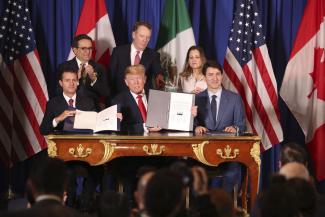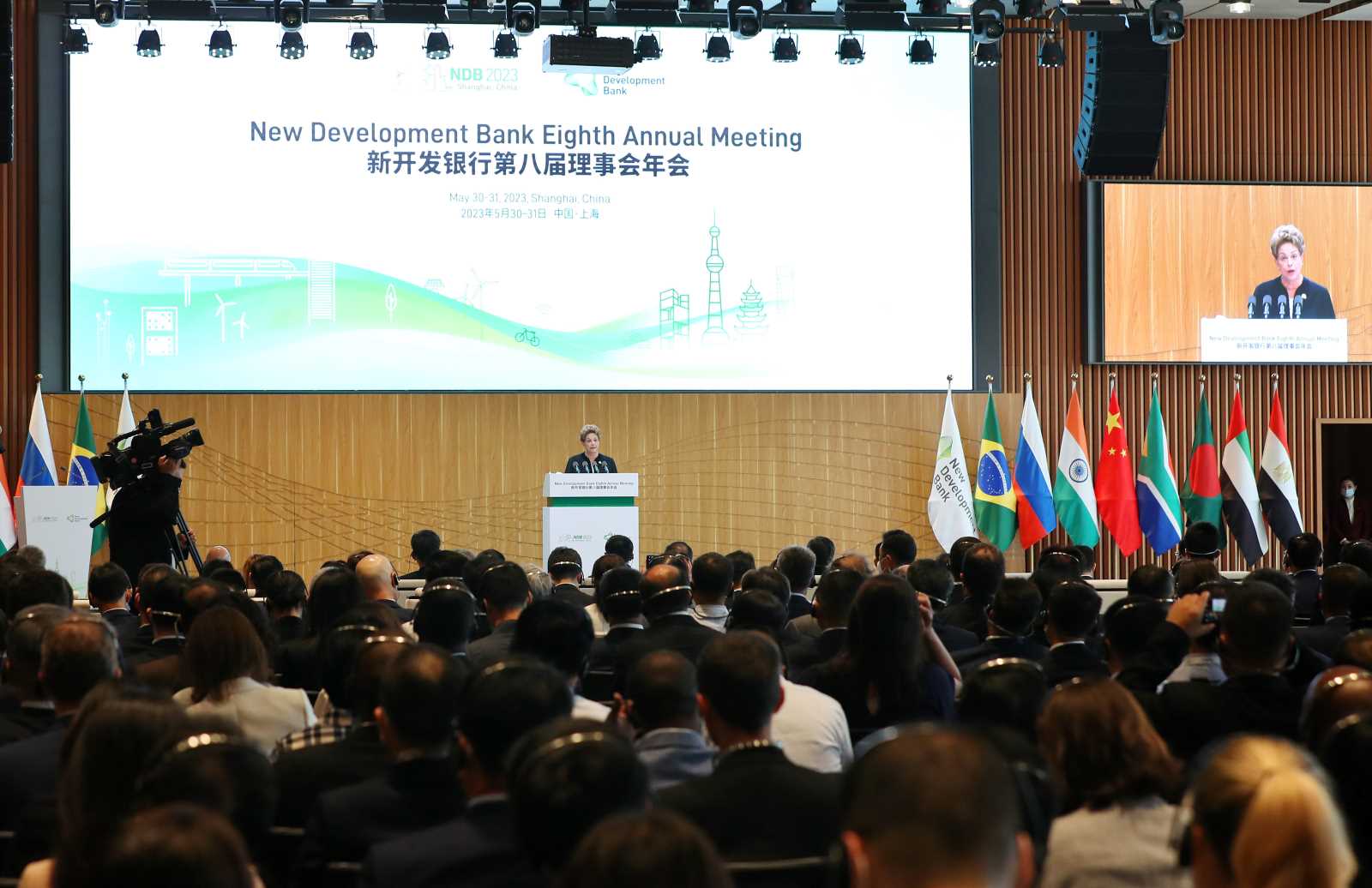Global governance
“Light at the end of the tunnel”

How do you assess the current trends in world trade?
Well, multilateral institutions such as the International Monetary Fund are scaling down their forecasts. World trade certainly is slowing down. While newly imposed tariffs have not necessarily caused all the problems, but they add to them. The European economy had slowed, the prospect in Japan remains uncertain, and the downward growth in China seems inevitable. The impending trade war makes things worse, even in the USA. The impact on some states and regions within the US varies. It is felt significantly in the Midwest where most products affected by China’s tariff retaliation are produced, including agricultural products. The number of farmers’ filing for bankruptcy (so called Chapter 12) in that region has been rising recently. The trade-war fallout also starts getting measured by the financial markets.
The USA and China have been imposing tariffs on one another, with US President Donald Trump having started the dispute. Is the WTO’s multilateral regime still in force?
There is actually bad news and good news. The bad news is that the tensions are being dealt with exclusively at the bilateral level. Washington and Beijing are negotiating with one another, and that in itself undermines multilateralism. The good news is that both sides still refer to WTO rules, accusing one another of breaking them. In that sense, the WTO system is still in force, so it is possible to return to the multilateral order once the current dispute is settled.
There are several contentious issues. What is the main one? Trump seems to be obsessed with the USA’s trade balance.
Yes, he is, but I do not think that is the main issue. What really matters are the disputes concerning:
- the protection of intellectual property rights,
- investors’ rights to start subsidiaries in China without being forced to involve Chinese shareholders and
- Chinese subsidies for specific company.
How the negotiations work out in the short run, is hard to predict. They may move ahead fast, but they may just as well stall. Things may get worse before they get better. In the long run, however, I am quite confident that China and the USA will reach agreements on the first two points. The reason is that it is really in China’s own interest to reach agreements. On the other hand, I don’t think China can compromise much subsidies because those subsidies are very important in terms of domestic policymaking.
The WTO actually has a mechanism for settling trade disputes, but it is not effective anymore. One reason is that the USA is now engaged in bilateral talks with China, but another one is that new adjudicators are needed, and Washington has been blocking new appointments. Has that problem been resolved?
No, it hasn’t. The Trump administration certainly does not want the WTO to be strong. The big question, however, is whether it is being temporarily disruptive or will actually manage to dismantle the WTO system. There is reason to hope that the impacts will prove temporary.
What impacts does the US-China trade dispute have on developing countries and emerging markets?
It is hurting them. The main reason is that many economies were driven by exporting commodities to China in the past decade or even longer. To some extent, some countries are also involved in value chains that run through China. The demand for the goods and services they provide is dwindling. The greatest problem is that too many governments felt that their countries could prosper by exporting raw materials to China. That is even true of my home country, Indonesia. The current trade war shows that this expectation was misguided.
Do you have any advice for the governments concerned?
Yes, and it is the same as 20 years ago. It is important to diversify economies and to improve productivity. Unfortunately, the commodities boom diverted policymakers' attention. They did too little to boost industrial development.
The Trump administration has not only imposed tariffs on China. It has also started something like a regional trade war with Mexico and Canada, but both countries fast agreed to a renegotiation of the North American Free Trade Agreement (NAFTA). What is your take on this development?
Well, it is too early to say because the new agreement has not been ratified. There may yet be some frictions, not least because the Democrats, who oppose Trump, now control the House of Representatives. Ultimately, however, I think the new United States-Canada-Mexico Agreement, as it is now called, will be ratified. Apart from the name, not much has changed. So if you think continuity is encouraging, you can read this as good news. On the downside, it reinforces the trend towards evermore regional trade deals, which make the global trade regime confusingly complex. For developing countries that need export opportunities in order to build new industries, things would be easier if we just had one coherent multilateral trade system in the WTO context. However, the proliferation of regional bilateral agreements has been going on for a long time, so the renegotiation of NAFTA does not really make things worse.
Trump has to date backed away from imposing tariffs on the EU, though he has complained about the USA importing more from Europe than exporting there. Do you think he will eventually start a trade war with Europe?
I don’t think anybody knows what Trump will or will not do. For the time being, it does not look as though there will be a US-EU trade war, and if Trump does impose new tariffs, on European cars for example, the EU will retaliate. The dispute may then well be settled as fast as the NAFTA dispute was, without causing much friction. At the same time, the EU and especially Germany may actually benefit from the US-China tensions. You export similar things as the USA does, so if tariffs make American goods more expensive in China, the EU could theoretically fill the gaps. That said, I think that Germany in particular should actually worry about trade balances. While Trump is over-obsessed with the matter, your government should be more concerned. World trade is wonderful and benefits all parties concerned, but if your partners suffer long-term current account deficits, problems are sure to arise. The German model of almost exclusively export-driven growth is not sustainable.
Germans like it, not least because of low unemployment. What’s wrong with it?
Well, if all countries around the world copied it, whom would we all be exporting to? Excessive export surpluses are unhealthy. For one thing, if unemployment in your country is only low because of excessive exports, that means that unemployment in other countries is excessively high. Moreover, trade imbalances imply financial imbalances. As Germany’s partners import more than they export, they have to incur debts, and excessive debts are destabilising, whether we are looking at private debts or government debts. Rising interest rates would fast increase the weight of the debt burdens moreover. In that sense it is good news that the Federal Reserve in the USA has recently backed away from raising interest rates, but serious risks remain.
What implications does the Brexit debate have for world trade?
It adds to the uncertainty, and it makes investors worry. On the upside, however, the EU looks increasingly stronger. It has been remarkably united in the Brexit negotiations, and no other country seems to be tempted to leave. The reason, of course, is that Brexit Britain looks increasingly isolated, and the advantages of the EU have become more obvious. Yes, the EU has serious problems, but Britain’s problems look much worse.
So how do you see the future of world trade?
There is light at the end of the tunnel. Yes, we are experiencing difficulties and setbacks, but so far, no irreparable harm has been done.
Iwan J. Azis is a regional science and economics professor at Cornell University in Ithaca, New York, and the University of Indonesia. He has provided consultation for governments in several Asian countries on domestic and international economic affairs. In this interview, he expresses his personal views.
http://iwanazis.com/














